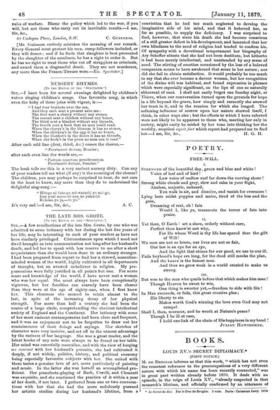THE LATE MRS. GROTE.
[TO THE EDITOR OF THE "SPECTATOR."]
SIR,—A. few recollections of the late Mrs. Grote, by one who was admitted to some intimacy with her during the last five years of her life, may be interesting to such of your readers as have not been similarly privileged. Circumstances upon which I need not dwell brought us into communication not long after her husband's death, and led her to speak with less reserve to me after a short acquaintance than she would have done to an ordinary stranger.
I had been prepared from report to find her a shrewd, masculine- minded woman of the world, highly cultivated in all departments of thought, but an avowed unbeliever in religion. My pre- possessions were fully justified in all points but one. For acute sense and knowledge of the world, I have never met a woman who was her equal. She must always have been exceptionally vigorous, but her faculties can scarcely have been clearer than they were at the age of eighty-one, when I first knew her. This clearness she seemed to retain almost to the last, in spite of the increasing decay of her physical strength. For more than half a century she bad been the centre of a large circle, comprehending the choicest intellectual society of England and the Continent. Her intimacy with some of her most eminent contemporaries had been close and frequent, and it was an enjoyment not to be forgotten to draw out her reminiscences of their doings and sayings. Her sketches of character were very incisive, and set off to the utmost advantage by the raciness of her language. She was a great reader, and the latest books of any note were always to be found on her table. Her mind was essentially masculine, and with the view of keeping au courant with her husband's pursuits, she had cultivated it deeply, if not widely, politics, history, and political economy being especially favourite subjects with her. She united with these tastes a genuine love of art, more particularly of painting and music. In the latter she was herself an accomplished pro- ficient. Her pianoforte-playing of Bach, Corelli, and Clementi was exquisite, and she continued the practice of it within a year of her death, if not later. I gathered from one or two conversa- tions with her that she bad the more sedulously pursued her artistic studies during her husband's lifetime, from a conviction that he had too much neglected to develop the imaginative side of his mind, and that it behoved her, as far as possible, to supply the deficiency. I was surprised to find, however, that since his death she had become conscious of a still greater defect in his development, and lamented that her own blindness to the need of religion had tended to confirm his. Of sympathy with a devotional temperament her biography of Ary Scheffer attests that she had not been destitute, but hitherto it had been merely intellectual, and unattended by any sense of need. The stirring of emotion occasioned by the loss of a beloved companion seems to have awakened that sense in her nature ; nor did she fail to obtain satisfaction. It would probably be too much to say that she ever became a devout woman, but her recognition of the divine will was habitual, and found expression in phrases which were especially significant, on the lips of one so naturally abhorrent of cant. I shall not easily forget one Sunday night, at Thiere, when our conversation turned upon the grounds for hope in a life beyond the grave, how simply and earnestly she avowed her trust in it, and in the reunion for which she longed. The softening influence of sorrow upon her nature showed itself, I think, in other ways also ; but the effects to which I have referred were not likely to be apparent to those who, meeting her only in society, might easily be misled by her tone into thinking her the worldly, sceptical esprit fort which report had prepared me to find:






































 Previous page
Previous page